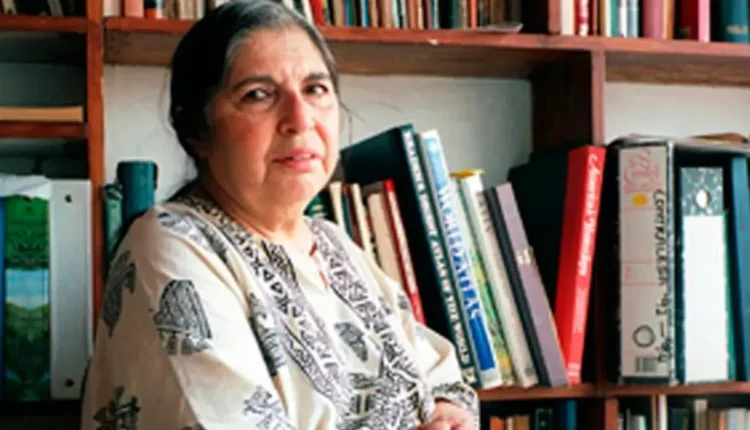Fatima Meer was a visionary, a scholar, and a courageous force in South Africa’s tumultuous history. Born on 12 August 1928 in the vibrant yet divided streets of Durban, South Africa, Meer was destined for greatness. Her father, Moosa Ismail Meer, an influential newspaper editor, and her mother, Rachel Farrell, a woman of Jewish and Portuguese descent who converted to Islam, laid the foundation for her awareness of racial inequality and her lifelong commitment to social justice.
From an early age, Fatima Meer understood that the struggle for freedom required unwavering resolve and action. At just 16 years old, she raised funds to aid famine relief in Bengal, India, marking the beginning of a life devoted to helping others.
Her education at the University of the Witwatersrand and the University of Natal would soon become intertwined with her burgeoning activism, setting the stage for her to become one of South Africa’s most influential voices in the fight against apartheid.
Fatima Meer: A Life Dedicated to Activism and Change
The streets of Durban in the 1940s were rife with tension as racial divides widened under the harsh policies of apartheid. Fatima Meer’s early activism began in her student days when she mobilized her peers to support the Indian community’s passive resistance campaigns. This movement brought her into contact with some of South Africa’s most iconic leaders, such as Yusuf Dadoo and Monty Naicker, who would go on to shape the country’s fight for freedom.
Meer and her close ally Kesaveloo Goonam became the first women elected to the executive committee of the Natal Indian Congress in 1950, a monumental achievement at the time. Their leadership was a symbol of unity between the Indian and African communities, particularly after the race riots of 1949.
Fatima Meer’s commitment to fostering racial solidarity was evident through her efforts to establish the Durban and District Women’s League, a pioneering organization that aimed to alleviate the suffering of the marginalized.
The rise of the National Party in 1948, which solidified apartheid as state policy, only fueled Fatima Meer’s activism. She became a founding member of the Federation of South African Women (FEDSAW) and was one of the driving forces behind the historic 1956 Women’s March to the Union Buildings in Pretoria. This demonstration, which gathered thousands of women to protest pass laws, became a defining moment in the anti-apartheid movement.
A Target of Oppression, Yet Unbroken
Fatima Meer’s relentless activism came at a cost. In 1952, she was banned for three years due to her outspoken opposition to apartheid. This would be the first of several bans and detentions she would endure over the next few decades. Despite government attempts to silence her, Meer never wavered in her pursuit of justice.
The 1960s and 1970s saw Meer collaborating with other key anti-apartheid figures, including Steve Biko, the leader of the Black Consciousness Movement. Meer’s embrace of this ideology further solidified her role as a key player in the struggle for liberation.
In 1975, she co-founded the Black Women’s Federation with Winnie Mandela, where she served as its first president. Her bold stance against apartheid led to her being banned once again in 1976, but this did not deter her. That same year, she survived an assassination attempt at her home in Durban, a testament to the danger she faced for standing up against the apartheid regime.
A Champion of Education and Empowerment
Fatima Meer believed deeply in the power of education to uplift and empower marginalized communities. Her academic career was as impressive as her activism. In 1956, she became the first non-white lecturer at the University of Natal, a significant achievement in the segregated South African academic system. She went on to lecture there until 1988 and held visiting professorships at several international institutions.
In addition to her teaching, Meer founded the Institute for Black Research (IBR) in 1972. The IBR became an important institution that conducted research on the plight of Black South Africans under apartheid and provided educational opportunities to those who had been systematically excluded from the formal education system.
Through her work with the Natal Education Trust and the establishment of schools for African students, Fatima Meer helped build a legacy of hope and progress for future generations. Her commitment to education did not stop with children; she also founded Tembalishe Tutorial College and the Khanya Women’s Skills Training Centre, where she equipped women with vital skills in sewing, business management, and literacy, ensuring they had the tools to improve their lives and those of their families.
The Fight for Global Justice
Fatima Meer’s activism extended beyond South Africa’s borders. She was a staunch supporter of the Iranian Revolution and was vocal in her protests against Western oppression in Palestine and Afghanistan. Her international focus led her to establish Jubilee 2000, a campaign aimed at canceling Third World debt, demonstrating her concern for oppressed peoples worldwide.
Her dedication to global justice was deeply intertwined with her Islamic faith and her belief in the interconnectedness of all struggles for freedom and dignity. Fatima Meer understood that apartheid was not merely a South African issue but part of a broader global system of inequality and exploitation.
Legacy of a Lifelong Revolutionary
Fatima Meer passed away on 12 March 2010, leaving behind a legacy that continues to inspire activists worldwide. She declined a parliamentary seat in post-apartheid South Africa, preferring instead to remain engaged in grassroots work. To the end of her life, she remained a vocal critic of injustice, continuing to advocate for the rights of the oppressed.
Her numerous books, including “Portrait of Indian South Africans,” “Higher Than Hope,” and “Race and Suicide in South Africa,” remain critical texts for understanding the intersections of race, gender, and politics in apartheid-era South Africa.
Also Read:Naranjan Dhalla: A Visionary Pioneer in Cardiovascular Research

